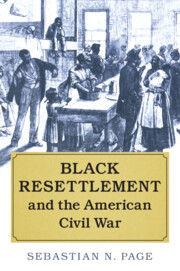Book contents
- Black Resettlement and the American Civil War
- Cambridge Studies on the American South
- Black Resettlement and the American Civil War
- Copyright page
- Dedication
- Contents
- Figures and Maps
- Acknowledgments
- Terminology
- Abbreviations
- Maps
- Introduction
- 1 The Revival of “Colonization,” to 1861
- 2 The Revival of “Emigration,” to 1862
- 3 The Republican Party and Resettlement, to 1863
- 4 Resettlement in Latin America, to 1864
- 5 Resettlement in the European West Indies, to 1865
- 6 Alternatives to Foreign Resettlement, to 1868
- Epilogue
- Index
1 - The Revival of “Colonization,” to 1861
Published online by Cambridge University Press: 21 January 2021
- Black Resettlement and the American Civil War
- Cambridge Studies on the American South
- Black Resettlement and the American Civil War
- Copyright page
- Dedication
- Contents
- Figures and Maps
- Acknowledgments
- Terminology
- Abbreviations
- Maps
- Introduction
- 1 The Revival of “Colonization,” to 1861
- 2 The Revival of “Emigration,” to 1862
- 3 The Republican Party and Resettlement, to 1863
- 4 Resettlement in Latin America, to 1864
- 5 Resettlement in the European West Indies, to 1865
- 6 Alternatives to Foreign Resettlement, to 1868
- Epilogue
- Index
Summary
In 1850, most white Americans interpreted black resettlement as meaning one institution and one location: the American Colonization Society (ACS) and the African settlement that it had founded three decades earlier, Liberia. As politicians from North and South sparred over dividing the acquisitions of the Mexican-American War (1846–8) into territories where slavery would be prohibited and those where it would not, they turned to the compromise of Liberian colonization, which promised to remove the source of their antagonism by simply removing black people. State legislators, endowed with greater power than their federal counterparts to proscribe African Americans, also redoubled their support for the ACS and the “black laws” that excluded, even expelled their black compatriots. Yet as lawmakers found it easier to persecute African Americans than to offer them positive alternatives, and as the citizens of a now-independent Liberia protested Americans’ presumption in foisting manumitted slaves and “recaptives” from the Atlantic slave trade on a small, struggling settlement, commentators contended that black Americans might need to colonize other parts of the world instead.
Keywords
- Type
- Chapter
- Information
- Black Resettlement and the American Civil War , pp. 15 - 54Publisher: Cambridge University PressPrint publication year: 2021

